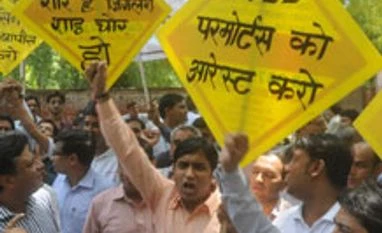NSEL investors seek liquidation of FT's foreign assets
Say setting up of numerous loss-making entities abroad against prudent business practices; FT says all entities regulated in each country, disclosures made
)
The Rs 5,600-crore payment crisis in National Spot Exchange (NSEL) is beginning to hit the Financial Technologies (FTIL) group’s interests abroad.
The NSEL Investors’ Forum has written to the Forward Markets Commission (FMC) and Securities and Exchange Board of India (Sebi), seeking liquidation of the group’s foreign assets to pay investor dues. About 13,000 investors had invested in paired contracts offered by NSEL. FTIL owns 99.99 per cent stake in the latter.
The Forum said substantial capital had been infused into numerous subsidiaries abroad. “We believe it is of utmost importance to ascertain the exact end-use of these funds and that they are brought back and utilised to pay off at least a part of the dues to the affected investors,” it said in its complaint.
Singapore Mercantile Exchange has received the highest capital investment at Rs 531 crore, followed by Financial Technologies Singapore at Rs 448 crore. Other major recipients include Global Board of Trade (Rs 282 crore) and Bahrain Financial Exchange (Rs 276 crore).
All these arms are loss-making. The complaint said: “Despite such significant influx of capital into these entities, the turnover generated by them has been all but negligible. These entities have also incurred regular and substantial losses over the observed period of the past five years.”
Questioning the logic of these investments, Sharad Kumar Saraf, convenor of the forum, said: “These observations bring us to question the reasons for moving such large sums of money into these numerous loss-making overseas entities. It clearly appears to be against normal prudent business practices to fund such loss-making entities.”
According to him, “Merely cashing in on these assets, employed in businesses which are a huge drain on the profitability of FTIL, may generate substantial money to pay back to the afflicted investors in the NSEL crisis.”
In an email response to Business Standard, an FTIL spokesperson said FTIL was a listed company and, thus, had made disclosures about the investments in these international exchanges over the years in its annual reports, and to stock exchanges in line with the listing agreement. “More, investments in the group’s international ventures are done only after getting the requisite approvals from relevant regulatory authorities in India and abroad. All these international ventures are regulated by the respective country-wise sector regulators, which are in turn accredited to the likes of International Organization of Securities Commissions and Futures Industries Association,” the spokesperson added.
The NSEL Investors’ Forum has written to the Forward Markets Commission (FMC) and Securities and Exchange Board of India (Sebi), seeking liquidation of the group’s foreign assets to pay investor dues. About 13,000 investors had invested in paired contracts offered by NSEL. FTIL owns 99.99 per cent stake in the latter.
The Forum said substantial capital had been infused into numerous subsidiaries abroad. “We believe it is of utmost importance to ascertain the exact end-use of these funds and that they are brought back and utilised to pay off at least a part of the dues to the affected investors,” it said in its complaint.
Singapore Mercantile Exchange has received the highest capital investment at Rs 531 crore, followed by Financial Technologies Singapore at Rs 448 crore. Other major recipients include Global Board of Trade (Rs 282 crore) and Bahrain Financial Exchange (Rs 276 crore).
All these arms are loss-making. The complaint said: “Despite such significant influx of capital into these entities, the turnover generated by them has been all but negligible. These entities have also incurred regular and substantial losses over the observed period of the past five years.”
Questioning the logic of these investments, Sharad Kumar Saraf, convenor of the forum, said: “These observations bring us to question the reasons for moving such large sums of money into these numerous loss-making overseas entities. It clearly appears to be against normal prudent business practices to fund such loss-making entities.”
According to him, “Merely cashing in on these assets, employed in businesses which are a huge drain on the profitability of FTIL, may generate substantial money to pay back to the afflicted investors in the NSEL crisis.”
In an email response to Business Standard, an FTIL spokesperson said FTIL was a listed company and, thus, had made disclosures about the investments in these international exchanges over the years in its annual reports, and to stock exchanges in line with the listing agreement. “More, investments in the group’s international ventures are done only after getting the requisite approvals from relevant regulatory authorities in India and abroad. All these international ventures are regulated by the respective country-wise sector regulators, which are in turn accredited to the likes of International Organization of Securities Commissions and Futures Industries Association,” the spokesperson added.
More From This Section
Don't miss the most important news and views of the day. Get them on our Telegram channel
First Published: Oct 08 2013 | 10:49 PM IST
